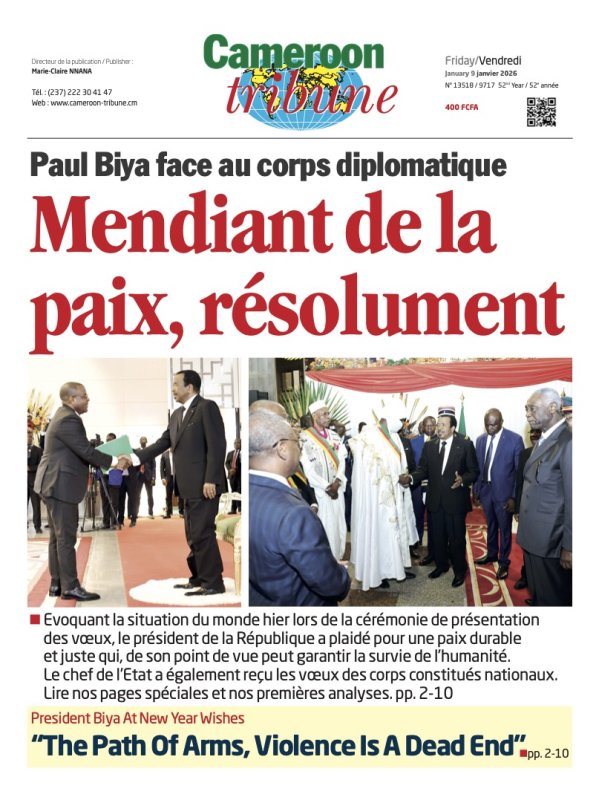Emigration : Make Home Better
- Par Emmanuel
- 17 Nov 2022 10:09
- 0 Likes
The government of Cameroon has deployed much efforts in recent times to facilitate the repatriation of Cameroonians who had taken up residence in neighbouring Equatorial Guinea. This is not the first time the government is facilitating the repatriation of its citizens who had emigrated to diverse countries in the world.
Emigration is as old as the world itself and it is an unstoppable phenomenon. People leave their countries to settle in other countries for different reasons. Some people explain the phenomenon on the grounds of safety as they escape from wars and conflicts, persecution and discrimination based on nationality, race, religion and political beliefs. Economic factors have also given rise to emigration as people would want to go to where wages are high, more jobs available and business activities lucrative. At times people are bound to migrate due to environmental factors. With the current climate change that has negative effects on diverse activities, people have the tendency to move to countries with favourable climatic conditions where they can grow their crops well and have easy access to water. Generally, for social reasons, people leave for other countries that have better quality of life as well as opportunities for themselves and their family members in terms of education, jobs and protection.
Irrespective of the reasons given for emigration, from every indication, home remains the best place in which to reside and carry out livelihood activities. The host countries of most emigrants are not always beds of roses as many are made to believe. People from developing countries who move to developed and industrialised countries in search of greener pastures at times are confronted by the problems of acceptability by the host countries and integration into their cultural systems and life patterns is not usually easy. There have been cases of open discrimination in relation to employment and education. Some have faced xenophobia attacks. With the heightening xenophobia many emigrants have lost their lives, their businesses destroyed, property confiscated and they have been repatriated empty-handed. People, especially Africans have been blinded by the phobia of supposed paradise in Europe and many youths even with gainful employment in their home countries have taken it as a “do or die” mission to absolutely get to Europe. There are reports of many of those emigrants most of them illegal who die in miserable conditions in the Sahara Desert in the course of their sojourn and others who drown in capsized overloaded boats in the Mediterranean Sea.
On the other hand, there are cases of people who have thrived and got well settled in their host countries. Many of them have used their stay to positively impact their families, communities and even countries.
No country nor continent can stop emigration. However, it is possible to curb the wave through conscious efforts. It is not only incumbent on the government but every socio-cultural and professional strata of the society each has the responsibility to make home the best. It is also possible to have more immigrants than emigrants to reverse the trend.
Peace and security are the key conditions sine-qua-non for any acceptable and admirable human society. The government has mechanisms to preserve peace, security and stability. Besides the regulations and institutions in place to ensure security and stability, the powers that be have to ensure equity, justice and equal opportunities for all citizens. Frustrations breed disorder, strikes whenever people rise to reclaim their rights. Many societies with the high rate of emigrants are those affected by conflicts, wars and political upheavals. This implies that government in its regulatory role must take the aspirations of all citizens into consideration and seek ways of peacefully meeting them.
The political class and civil society organisations have to make their home countries worth living in. Opposition political leaders in many countries, especially young democracies tend to present their countries to the international community as the “devil’s land” so long as they are not the ones in power. They would want use to every means to get to power and the result is political upheavals. In this case the atmosphere becomes morose pushing such political party militants to seek ...
Cet article complet est réservé aux abonnés
Déjà abonné ? Identifiez-vous >
Accédez en illimité à Cameroon Tribune Digital à partir de 26250 FCFA
Je M'abonne1 minute suffit pour vous abonner à Cameroon Tribune Digital !
- Votre numéro spécial cameroon-tribune en version numérique
- Des encarts
- Des appels d'offres exclusives
- D'avant-première (accès 24h avant la publication)
- Des éditions consultables sur tous supports (smartphone, tablettes, PC)











Commentaires